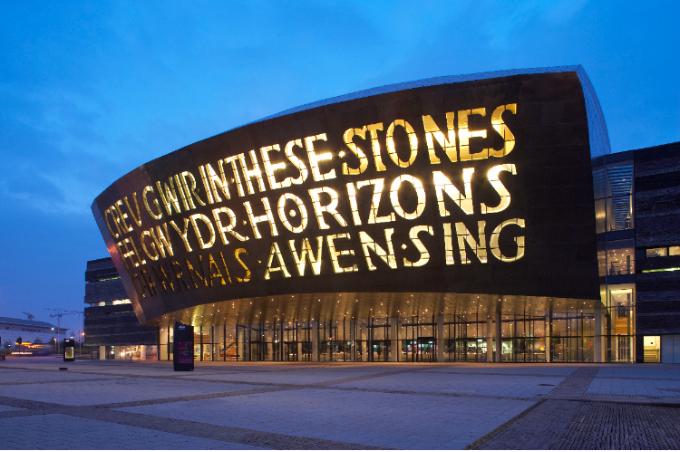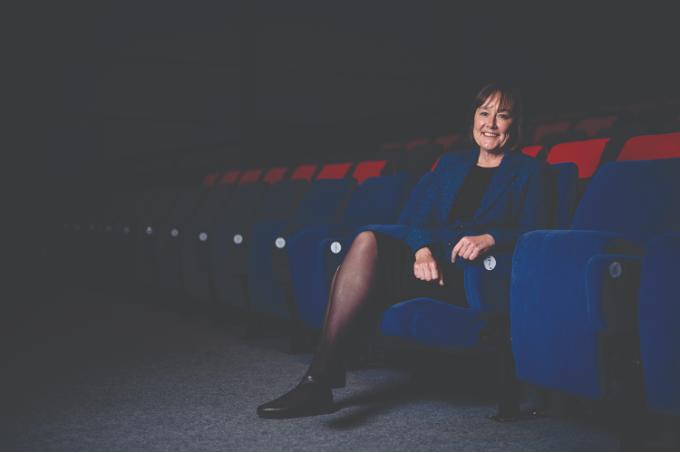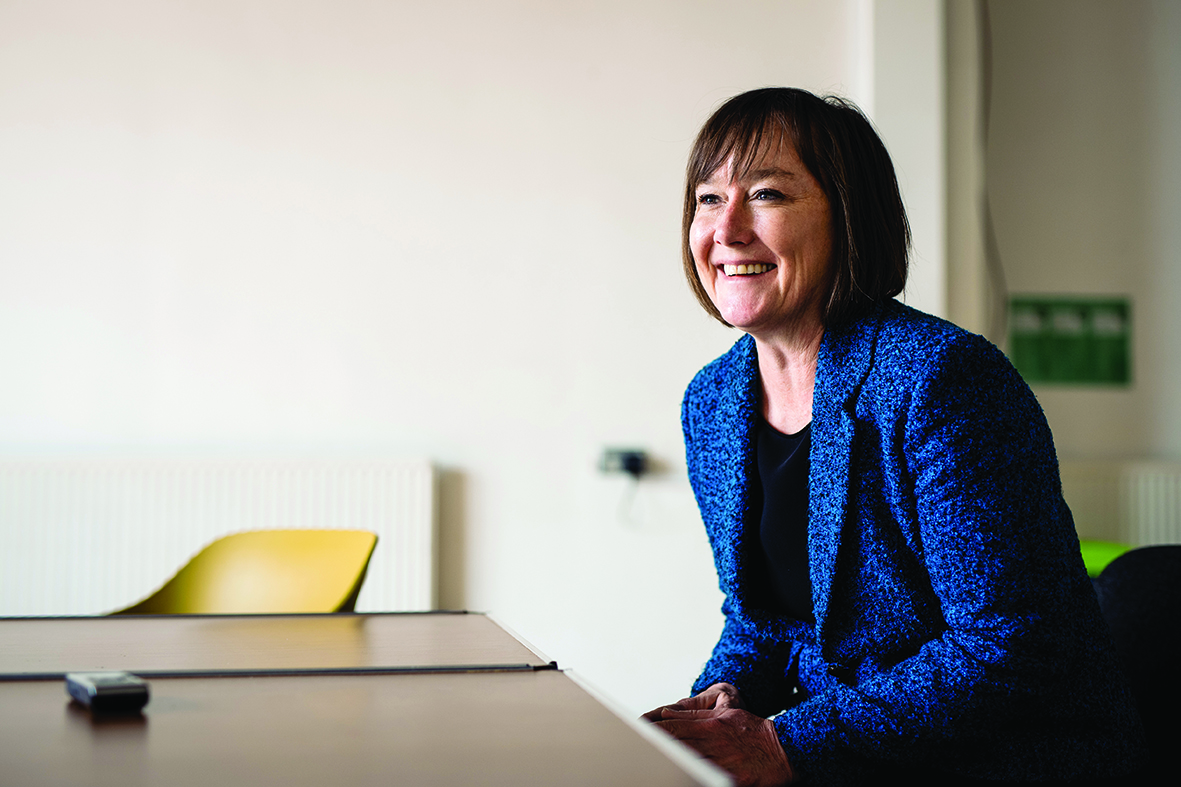Labour's Jo Stevens: "Culture is culture, there shouldn’t be a war element to it"
Jo Stevens MP looks out over Cardiff Bay from the inscription windows of the Wales Millennium Centre | Credit: Polly Thomas
13 min read
Cardiff Central MP Jo Stevens has her dream brief as shadow culture secretary. She takes Georgina Bailey around the city’s cultural landmarks to talk about what Wales is getting right in supporting the creative industries, and the personal and professional impacts of Covid.
“This is a building for Wales that’s designed and built for Wales. We’re really proud.”
Jo Stevens and I are in the Penderyn Awen foyer of the Wales Millennium Centre, sunlight poking in through the landmark inscription on the front of the building, giving us a view over Cardiff Bay. Pre-pandemic, the building would have 3,000 people filtering through on a busy day. Staff tell us there are only about 10 of us today.
When Stevens, MP for Cardiff Central and Labour’s shadow culture secretary, first moved to the city 32 years ago, the Cardiff Bay redevelopment hadn’t even started – now, as well as the Millennium Centre, the Bay is home to the Welsh Senedd and an expansive waterside bar and restaurant complex. The BBC Cymru headquarters looms in the skyline from the stage door, while the centre itself has three theatres, and houses nine different organisations, including the Welsh National Opera, Literature Wales and National Dance Company Wales.
While Stevens is getting photos taken, I peek out of the windows to identify filming locations used in Doctor Who and Torchwood, which began filming there in 2005.
The Millennium Centre [Credit: Phil Boorman]
 “It’s weird, it’s almost like it’s become part of the fabric of the city,” Stevens says. “You see filming going on and you don’t really bat an eyelid. When Doctor Who was first on, everyone would say, ‘Oh I’ve just seen Billie Piper on Queen Street’. But it’s almost like people don’t even think about it now. It’s just what we do as a city; hugely prevalent and creates lots of jobs – and we want more of it.”
“It’s weird, it’s almost like it’s become part of the fabric of the city,” Stevens says. “You see filming going on and you don’t really bat an eyelid. When Doctor Who was first on, everyone would say, ‘Oh I’ve just seen Billie Piper on Queen Street’. But it’s almost like people don’t even think about it now. It’s just what we do as a city; hugely prevalent and creates lots of jobs – and we want more of it.”
The creative industries are one of Wales’ fastest-growing sectors, with an annual turnover of more than £2.2bn, and employing more than 56,000 people – a growth of 40 per cent in 10 years. As well as BBC Cymru Wales, S4C and ITV Cymru Wales, a new generation of independent production companies is also now located in Cardiff. Recent filming in the city includes His Dark Materials, a major Bollywood film, Donkey, as well as long-running TV shows like Casualty.
Later, Stevens and I will visit Chapter, a contemporary cultural centre and social space, which is one of the host venues for the UK’s largest arts prize, the Artes Mundi. This year, the capital of the Land of Song has also been named UK’s first city of music. Arts and sports are embedded into the city – both culturally and economically.
Stevens attributes the success of the city’s cultural scene to several factors: the Welsh love of music and arts; the strong links with educational institutions (the city is home to the Royal Welsh College of Music & Drama, and two other universities’ creative and media departments); and the visibility of local success stories.
“You don’t just hear about these things: you can see it; you can understand it,” Stevens says. “People in school genuinely do talk about having a career in production, or film and television or music. And it is a really innovative and inspiring thing to be part of, and that’s why keeping our venues open is so critical to that ecology.”
While venues may now reopen in Wales, it has been a slower journey than in England – part of Mark Drakeford’s “cautious” approach to the pandemic, which Stevens says played a big part in Welsh Labour’s success at the recent Senedd elections. However, the economic considerations of putting on performances with dramatically reduced audiences means that many will have to stay shut.
I just don’t think the Treasury understands [the sector]. I don’t think DCMS understands it, to be perfectly honest. It doesn’t seem to be a priority
The crucial thing for Stevens is the difference in how the Welsh government approaches the cultural sector and its role in the economy compared to Westminster. It opened a new government agency, Creative Wales, in early 2020 and Drakeford made culture part of the economy brief in a recent reshuffle.
Stevens believes the Welsh government also has a better understanding of how the sector, with its high proportion of freelancers, functions than its Whitehall counterpart. “That’s why Welsh government stepped in with the freelancer fund.”
The £20m fund supported almost 3,500 freelancers in creative sectors in Wales over the pandemic, paying a total of £5,000 each in three tranches of support. Stevens draws the contrast with the three million people excluded from the UK’s Self Employed Income Support Scheme, including many creatives.
She says: “I just don’t think the Treasury understands [the sector]. I don’t think DCMS understands it, to be perfectly honest. It doesn’t seem to be a priority. It’s not at the forefront of their minds. Yet we know the creative industries are one of the fastest growing sectors, £111bn a year to the UK economy, so why wouldn’t you look to protect that sector? Not just because it’s important now, but because it’s had sustained growth, and it’s inextricably linked with tourism and hospitality and creating jobs, and money for the economy.”
This lack of understanding is, Stevens suggests, demonstrated by challenges facing both Chapter and the Millennium Centre during the pandemic, with both generating more than 80 per cent of their income from commercial activities.
“The irony of it all was in organisations like Chapter, people had worked so hard and been told to move away from subsidy, had built up commercial revenue,” Stevens says. “And, in a way, they ended up getting punished for it. I don’t know what the public perception about funding is; I suspect, anecdotally that a lot of people still think the arts are massively subsidised. But from the two examples that we’ve seen today, it’s just not the case.”
Chapter, which turns 50 this year, was helped by donations from the public and local businesses throughout lockdown, and is clearly something of a local institution. As well as a focus on supporting Welsh art and culture, Stevens says she was a regular at the family-friendly bar before Cardiff City games when her two sons were small, and even attended antenatal classes there.
Before the pandemic, it housed 38 small companies, groups and freelancers – now that is up to 53, totalling around 250 people.
“The big thing about the Culture Recovery Fund was it was all talking about buildings,” Stevens says. “It wasn’t talking about the people. And, yes, we need to keep the buildings. We need to keep the National Gallery and the Southbank Centre and the West End and theatres and art centres all across the country. But there was a heavy emphasis on Crown Jewels, and the buildings, and without talented people inside them doing what they do, there’s no point having the buildings.”

Stevens in the cinema of Chapter, Cardiff [Credit: Polly Thomas]
Stevens was born in 1966 in Swansea, South Wales, before her family emigrated to Canada when she was six months old under the “Ten Pound Pom” scheme. The family stayed in Canada for a few years before moving back to South Wales and then to near Mold, in Flintshire, North Wales, for most of her school years. “It was lovely when I look back on it – a little village in the middle of the countryside,” she recalls. “I thought at the time, ‘God, this is really boring’. But now I look back, and every time I go back to North Wales, I look at it and I just think, what a fabulous place to be able to grow up.
Her mother was musical, singing in a choir, but one of her most formative experiences was the opening of the Theatr Clwyd in 1976.
“It absolutely changed my life,” Stevens says. “I went from living in a village with absolutely nothing to do and all of a sudden, on the doorstep, within walking distance, was a theatre where I could go and see films, I could see productions. The Shakespeare that you learn in school, I could actually go and see it on the stage.”
The venue also introduced her to one of her great loves, when the Welsh National Opera brought Mozart’s The Magic Flute to the venue when she was 12. “Me and a few of my mates got selected from school to be part of the chorus. I was a peasant’s child; that opened opera to me. I’ve been an opera lover ever since. But had that theatre not been there, I never, ever would have enjoyed opera.”
She says she is an opera traditionalist, although – “I’m not, like, a Wagner fan, that’s not really my thing” – and beyond that her music taste is very eclectic. There seems to be no rhyme or reason to the list of gigs she’s been to. “I will literally go and watch any live music. I don’t really mind. I just love being in a venue – whether it’s a massive one or a little dingy club – just the emotional connection that you get from watching and listening to a live performance.”
She’s seen Paul Heaton 25 times, has tickets for Fatboy Slim later in the year, and is hoping to get to Blondie, Madness and Squeeze (if late votes in Parliament allow). Her answer to her favourite band is immediate: Led Zeppelin, and although she’s never actually seen them as a group live, she did see Robert Plant in the Newport Leisure Centre.
The former trade union lawyer’s passion for culture is clear – a Starmer supporter in the 2020 leadership election, she says she got this brief because it was the one she wanted.
Stevens is also a massive sports fan, who dreams of being able to watch cricket every day. Her teams are Glamorgan County Cricket Club, Cardiff Blues in rugby union, and both Cardiff City and Tottenham Hotspur football clubs, “if that’s allowed”, she says.

“I just love the emotion of it,” she explains. “It’s a bit like music, there’s an emotional connection. And the thing about team sports, particularly, is the leadership – you can see all of the psychology that goes into it, and the thrill of being part of a successful team. It’s a bit like election campaigns when you win, it’s that kind of feeling. I’ll get all nerdy about this now, but I just love the psychology of it and the performance element and the emotional connection to it. There’s nothing else like it.”
She thinks fellow Spurs supporter Tracey Crouch will do a “great job” chairing the government’s fan-led review of football governance, announced after the European Super League crashed and burned. However, she is a bit concerned that of the 10 people announced for the review board, only one is a representative of fan groups.
“I want to see and hear from the government about how fans are going to be involved in this review. Because we’ve got to have confidence that it really, truly will be fan-led, in order to make sure that fan’s voices are right at the heart of the reforms when they come out,” she says.
When it comes to what reforms she’d like to see, she is not swayed by calls to move to the German model, where fans own 50 per cent +1 of the club. “It’s definitely worth investigating, but I don’t think it’s the only thing which should be looked at.”
On BBC reforms, she says she is waiting to see if “anyone comes up with anything better” than the licence fee model. “Nobody has so far… Labour isn’t wedded forever and a day to the licence fee. But for the moment, that appears to be the best financial arrangement that we can have. In future years different things might be looked at.”
Seeing people around you that were really, really struggling. It was horrific
As well as the general challenges of taking on a new job in the pandemic, Stevens also had a terrifying experience with Covid herself, ending up in hospital for almost a week at the beginning of January.
“I just got very ill. And the weird thing about it all is I can’t actually remember a lot about it, because I was just a bit out of it. I was at home; I hadn’t appreciated how ill I’d got, and my oxygen levels plummeted and I got taken into hospital.”
She was on two of the steroid trial drugs, and has made an almost full recovery – she doesn’t have long Covid, but says she does now have a very bad memory and brain fog, as well as some hair loss.
“I don’t really remember very much at all. I have glimpses of conversations, and being frightened – I was really frightened. But other than that, not very much: just this enormous sense of relief and how lucky I felt to come out the other side of it. I couldn’t wait to get out of hospital, because although I will eternally be grateful to the people that looked after me, I just wanted to get out of there because it was so grim. Seeing people around you that were really, really struggling. It was horrific.”
She is full of praise for the “unbelievable” NHS staff and what they’ve gone through, and all the support she had from her staff and Westminster colleagues. “I was really overwhelmed by the people who got in touch. [This] is my opportunity to publicly say a huge thank you to them because they got me through it,” she adds.
Looking ahead, Stevens would like the government to put culture at the heart of the UK’s recovery from Covid – both in terms of the economy and the country’s well-being. However, she is not optimistic, describing the government’s cultural bandwidth as dominated by the “culture war”.
Asked if Labour can win said war, she responds: “I don’t think it needs to be a war. For me, culture is culture, there shouldn’t be a war element to it. It’s part of our everyday lives and we should celebrate it.”
On recent debates about the Union Jack, she says: “Some people like flags, some people don’t. I think there are more important things to worry about, to be perfectly honest.”
Instead, Stevens would like to see a focus on inward investment in creative hubs like Cardiff, Manchester and Leeds, and boosting links between existing companies, the public sector and government finance – as well as a change in the public narrative from the government about arts careers, and cuts to courses.
“If you’re looking at it from the outside, it would be difficult not to think [the government is politicising arts and culture]. It frustrates me, because there is so much more that the government could be doing and needs to do, [given] the role that arts and culture could play in the national recovery.
“I just wish that the focus was on that rather than trying to create division and problems.”
